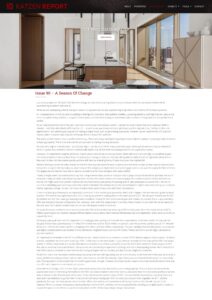Just as we prepare to “fall back” with the time change, it’s also time to spring ahead to try to foresee what the real estate market will be experiencing as winter’s chill sets in.
While we are undergoing a literal change in seasons, it appears we are also experiencing a figurative one in terms of the housing market.
An increased amount of turbulence is adding to feelings of uncertainty. Geo-political volatility, upcoming elections, and high interest rates are all factors in determining whether it is a good time to jump into the home-buying or investment sales markets or hang back until things feel more settled.
As we head toward the end of the year, common concerns are international unrest – namely the Israel-Hamas War and continued strife in Ukraine – and their aftershocks affecting the U.S. – as well as our upcoming elections, job losses and the migrant crisis. Confusion, fear and apprehension can certainly put a pause on making a major move, such as purchasing a property. However, as we head into the U.S. election season, which is traditionally a season of change, there is reason for optimism.
The reality is that there is never a perfect time to buy. There are always intelligent arguments to be made for waiting or jumping in when it comes to buying property. There is no one-size-fits-all approach to making housing decisions.
On one hand, higher interest rates – at a 20-year high! – can be a turn-off to many potential buyers. Existing homeowners may be reticent to trade in a great, low, locked-in rate for a substantially higher one, all the while also paying more for an upgraded property.
However, it’s important to explore all factors. Continuing to rent will do no one any favors. Rents will continue to be high, so would-be buyers should be poised to move quickly if they are waiting for a change in rates or inventory. Being able to sublet would be highly beneficial should they want to dive into the market quickly, as there will likely be a feeding frenzy if rates drop even the slightest bit.
Renters looking to enter the sales market for the first time typically have the least to spend (and the most to lose) so they may be more reticent to take the plunge.Understandably so, since many in this category are dependent on low mortgage rates or are parents buying for their children. Mortgages are also harder than ever to secure, as banks are far more stringent than years before.
Initially, it might seem counterintuitive to say that rising interest rates can be an indicator that buying now can be beneficial, but hear me out: If everyone simply sat static and waited to jump back into the real estate market until rates dropped, the market would be so flooded that any money one might save from a lower interest rate would be lost by sales prices increasing, even if rates plateaued at around 5%. It will be no surprise that bidding wars will ensue when the market is flooded. The bottom line is, the spread between higher rates and bidding up in a better market equalizes savings. As such, for many, it makes more sense to buy now, with fewer competitors.
In terms of pricing and inventory, we expected a correction in the market post-pandemic, which didn’t happen. We are now seeing this delayed reaction. The market has capitulated since 2021, heating up and then cooling down in the latter part of 2022. This delayed reaction was forced by inflation and the Fed, causing a housing market slowdown, mostly for first-time home buyers and resales. As a result, there is approximately 20% less inventory this year compared to last. However, even with that steep drop in inventory, there’s reason to be optimistic as we head into the new year: Manhattan’s median home price rose 2% despite market turbulence.
As usual, the luxury market remains less turbulent; the 10% of the market has ticked up 4.3% from last year, when the metric stood at $5.75 million, according to our recently released Elliman Report. Luxury deals, which totaled 288 between July and September 2023, were up 23.6% on a quarterly basis.
For buyers paying all cash and not dependent on mortgage rates, pricing is in line with their expectations. In the last month, the top sale for Douglas Elliman was a penthouse at 111 West 57th Street that sold for $52.9 million. In addition, over the summer, penthouses at 151 Wooster Street and 150 Charles Street sold for a whopping $50 million and $52 million, respectively. This just highlights that amenity-laden luxury towers and highly coveted penthouses located in tony Manhattan neighborhoods, such as 57th Street, Tribeca and Soho are still highly attracted to monied investors.
It’s important to remember that NYC is a different animal –advice doled out to investors outside of NYC doesn’t apply to those buying in Gotham. Airbnb’s crackdown on short-term housing in NYC – a hot topic in the news lately – is just another example of how nuanced the NYC real estate market is. While a real estate pro would likely advise an investor to purchase a property to use for short-term rentals for financial gain, in NYC that advice would be drastically different. Because we live communally in apartment buildings and not in freestanding homes like in most of the rest of the country, in essence, we’d not only be inviting strangers into our homes, but also into our neighbors’ domiciles.
To wit: Not only is the real estate market always adjusting itself and self-regulating, but so is the industry. In the first half of this year, according to Axios, 60,000 real estate professionals turned in their licenses, and left the industry. https://www.axios.com/2023/05/26/realtor-nar-real-estate-jobs. This seperation of the wheat from the chaff is good news, though. It leaves only those top-tier experts who have stood the test of time and can offer valid experience and market perspective.
Even with its challenges, NYC is never static, and speed bumps that arise also tend to come and go quickly. This is why it is so important for anyone interested in immersing themselves in the NYC real estate market to lend their ear to a seasoned New York real estate professional who truly understands the frenetic pace of the area. These OGs know the cyclical nature of NYC. I’ve said it before but it bears repeating: there is a tried-and-true resilience long-time New Yorkers know first-hand, having seen NYC not only bounce back from tragedies like 9/11 and the pandemic, but soar. As more people return to their offices, the stability and convenience of having a home in the city will only add to its rebound. There is a reason why people consistently want to live in NYC, and that cannot be quantified by anything as tangible and mundane as square footage or price; there is a world on every block in NYC. While many things change, that will not.

